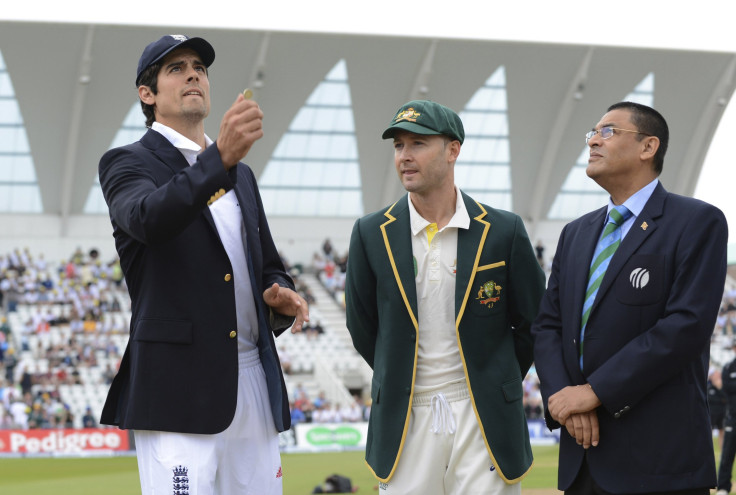The Ashes - One Of The Oldest, Fiercest Rivalries In World Cricket Where Players Play For Pride [SLIDESHOW]

More than 100 years ago, on Aug. 29, 1882, when an English cricket team lost a five-day game to its Australian counterpart, it led critics to pronounce the demise of cricket in England -- the game's birthplace.
But, it was not death that took place at The Oval -- one of the most revered venues in the world of cricket -- in London on that day. Instead, it was the birth of one of the fiercest rivalries in the world of sports, which still carries on and has come to be known by a unique name -- “The Ashes.”
On Wednesday, England and Australia confronted each other at the Trent Bridge stadium in Nottinghamshire, England, for the 67th time in the Ashes’ history. And, players from the two countries, thousands of miles apart, will battle on field over the next few weeks for pride and the honor of holding aloft a trophy filled with ashes.
“I have always maintained the Ashes are a great stage on which to make a career and make a name for yourself,” Michael Vaughan, a former captain of the England cricket team, said in 2009.
“If you have a great Ashes series then the whole country will know who you are… I would be remembered for bringing the Ashes home in 2005. That says everything about how important the Ashes are. It is as if performing against Australia lends legitimacy and standing to an international career.”
To better understand the birth and the legacy of this generations-old rivalry, we need to travel back in time for a bit.
Shattered and shamed by defeat on home soil in the 1882 game, England's cricket team was further embarrassed by a satirical obituary published in a British newspaper, The Sporting Times, which declared the death of English cricket, saying:
“The body will be cremated and the ashes taken to Australia.”
Now, it was England’s turn to travel to Australia -- an arduous journey that took weeks via ship -- in the following winter (1882-83) in a quest to salve their wounded pride.
This time, England took revenge by beating Australia, and Ivo Bligh, the then captain of the English cricket team, was presented with a small terra cotta urn, which is reputed to contain the ashes of a cricket bail, by a group of Melbourne women, symbolizing the winning of the 'Ashes.' A bail is a small piece of wood that sits, along with another one just like it, atop the three wickets that mark the two ends of a cricket pitch.
However, that particular urn, which is now kept at the Melbourne Cricket Ground, has never been adopted as the trophy for the Ashes series. Instead, replicas of the urn are held aloft by victorious teams.
Starting with the 1882-83 Ashes series win, England won the next eight competitions, while Australia managed to win the Ashes for the second time only in the ninth edition of the series -- almost 10 years later -- in 1891-92. Of course, following that defeat, England bounced back again to win the next three Ashes series in a row from 1893 to 1896.
Most Ashes tournaments follow a best-of-five format, and each test match -- the original, traditional version of the game -- is played across five days. And, the evenly-matched tug of war has continued with Australia winning only one tournament more than England over the decades.
Here's a comparison:
Of the 310 test matches played in The Ashes so far, Australia has won 123 while England has come up victorious in 100 matches. The remaining 87 matches were drawn. And, Australia has won the Ashes tournament 31 times, compared to England’s 30.
For players of both countries, being chosen to play in an Ashes tournament is regarded as the ultimate achievement of one's career, and winning it is the definition of their success as a cricketer.
"It's a bit of a dream come true starting an Ashes series at home in front of all your family and friends at Trent Bridge," Stuart Broad, a fast bowler for England, said recently. “But it's all about winning, because if you lose, you look back at that match with horrible memories. But if you win, you have very fond memories, so it's an advantage for us as a team.”
Coming back to the latest edition of The Ashes -- the 2013 Ashes series -- currently underway in the UK, the home team is seen as the stronger of the two teams, and is touted to win the tournament. And, Michael Clarke, the captain of the Australian team, believes that every single player in his team is aware of the significance of the Ashes and, therefore, will play for victory.
"I know especially back in Australia, this is the pinnacle of an Australian cricketer, to play Test cricket in England, be part of an Ashes series and I'm sure there will be judgments made on our performances, and as captain of the team you should be accountable," Clarke said.
And, if England do indeed win this year's tournament, it would be their third win in a row, and perhaps, encourage the Australian media this time to lay the Aussie team to rest. Until the next edition rolls along, that is.
© Copyright IBTimes 2024. All rights reserved.












